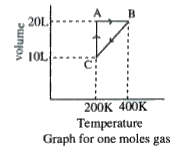For polytropic process = constant, (molar heat capacity) of an ideal gas is given bySolution in Telugu
The correct Answer is:B
,
Topper's Solved these Questions
- BOOK - AAKASH SERIESCHAPTER - CHEMICAL THERMODYNAMICSEXERCISE - LECTURE SHEET (EXERCISE-I) (LEVEL - II (ADVANCED) MORE THAN ONE CORRECT ANSWER TYPE QUESTIONS)12videos
CHEMICAL THERMODYNAMICS
- BOOK - AAKASH SERIESCHAPTER - CHEMICAL THERMODYNAMICSEXERCISE - LECTURE SHEET (EXERCISE-I) (LEVEL - II (ADVANCED) LINKED COMPREHENSION TYPE QUESTIONS)5videos
CHEMICAL THERMODYNAMICS
- BOOK - AAKASH SERIESCHAPTER - CHEMICAL THERMODYNAMICSEXERCISE - PRACTICE EXERCISE50videos
CHEMICAL THERMODYNAMICS
- BOOK - AAKASH SERIESCHAPTER - CHEMICAL THERMODYANMICS EXERCISE - Questions For Descriptive Answers28videos
CHEMICAL THERMODYANMICS
- BOOK - AAKASH SERIESCHAPTER - ELECTRON MIGRATION EFFECTS EXERCISE - QUESTIONS FOR DESCRIPTIVE ANSWERS10videos
ELECTRON MIGRATION EFFECTS
Similar Questions
The following is/are extensive property/properties
01:12View Solution
Process A→B represents05:44View SolutionA system has internal energy equal to E1,450J of heat is taken out of it and 600 J of work is done on it. The final energy of the system will be
06:50View SolutionHow does heat of neutralisation value change with the chemical nature of acid and base?
09:48View SolutionHyperconjugation effect is also termed as 'no bond resonance'. Why?
13:54View SolutionA certain ideal gas undergoes a polytropic process PV^(n) = constant such that the molar specific heat during the process is negative. If the ratio of the specific heats of the gas be gamma , then the range of values of n will be
02:24View SolutionA polytropic process for an ideal gas is represented by equation PV^(n) = constant . If g is ratio of specific heats ((C_(p))/(C_(v))) , then value of n for which molar heat capacity of the process is negative is given as
01:48View SolutionFind the molar heat capacity of an ideak gas in a polytropic process pVn=const if the adiabatic exponent of the gas is equal to γ. At what values of the polytropic constant n will the heat capacity of the gas be negative ?
06:55View SolutionFor an ideal gas the ratio of specific heats is (C_(p))/(C_(v)) = gamma . The gas undergoes a polytropic process PV^(n) = a constant. Find the values of n for which the temperature of the gas increases when it rejects heat to the surrounding.
05:09View Solution(a) A polytropic process for an ideal gas is represented by PV^(x) = constant, where x != 1 . Show that molar specific heat capacity for such a process is given by C = C_(v) + (R)/(1-x) . (b) An amount Q of heat is added to a mono atomic ideal gas in a process in which the gas performs a work (Q)/(2) on its surrounding. Show that the process is polytropic and find the molar heat capacity of the gas in the process.
03:38View SolutionFor polytropic process PVn = constant, molar heat capacity (Cm) of an ideal gas is given by:
03:40View SolutionFigure demonstrates a polytropic process (i.e.PVn = constant ) for an ideal gas. The work done by the gas be in the process AB is
_S01_086_Q01.png) 04:36View Solution
04:36View Solution9.The molar heat capacity of a polytropic process (PV^(n)) is C=C_(v)+(R)/(10) .The value of the polytropic exponent n is ?
01:54View SolutionAn ideal has undergoes a polytropic given by equation PV^(n) = constant. If molar heat capacity of gas during this process is arithmetic mean of its molar heat capacity at constant pressure and constant volume then value of n is
02:20View SolutionFind the molar heat capacity of an ideal gas with adiabatic exponent gamma for the polytorpic process PV^(n)= Constant.
06:34View Solution

